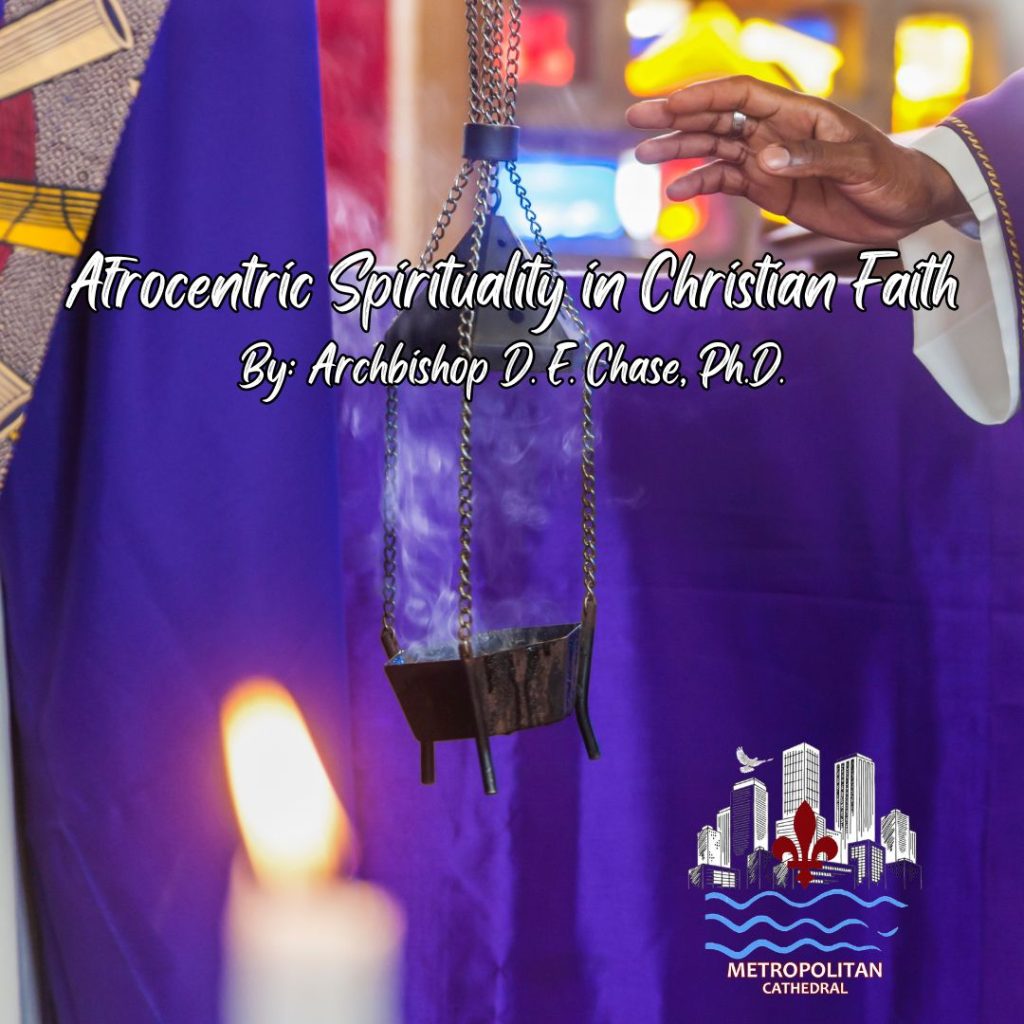
Afrocentric Spirituality in Christian Faith
By: Archbishop D. E. Chase, Ph.D. OSP
Introduction:
Within the expansive realm of Christian spirituality, the distinctive avenue of Afrocentric spirituality invites believers to delve into a tapestry woven with threads of faith and African traditions. This article navigates the intricacies of Afrocentric spirituality within the context of Christian faith, illuminating its biblical foundations, prayer dynamics, worship expressions, and the profound impact it exerts on community engagement and social justice. Grounded in both scriptural references and academic insights, Afrocentric spirituality emerges as a transformative journey that resonates with the diverse and vibrant heritage of the African diaspora.
The Essence of Afrocentric Spirituality:
At its heart, Afrocentric spirituality stands as a celebration of the intrinsic connection between Christianity and the diverse spiritual traditions of Africa. Recognizing the roots of the Christian faith on the continent, Afrocentric spirituality embraces the cultural wealth that has historically shaped believers. This authentic engagement prompts Christians to interact with their faith in a manner that reflects the diversity and vibrancy intrinsic to the African diaspora.
Biblical Roots and Narratives:
The scriptural exploration of Afrocentric spirituality begins with an examination of the African presence in the Bible. Acts 8:27-39 vividly recounts the conversion of the Ethiopian eunuch, underscoring the early connection between Africa and Christian faith. Biblical narratives such as the saga of Joseph in Genesis 37-50 and the involvement of Africans like Simon of Cyrene in the crucifixion (Mark 15:21) further underscore the profound interweaving of African history and the Christian narrative.
Genesis 10 offers a panoramic view of the descendants of Noah, showcasing the diversity of humanity, including the regions of Africa. This scriptural insight becomes a foundational element in understanding the unity of faith across various cultures and backgrounds.
Prayer Practices Rooted in African Tradition:
Central to Afrocentric spirituality is the practice of prayer, drawing inspiration from traditional African customs. The communal prayer emphasized in Matthew 18:19-20 mirrors the collective spirit ingrained in African spiritual practices. The infusion of ritual elements and a deep connection to nature during prayer echoes biblical themes found in Psalms and Ecclesiastes, facilitating a profound and authentic communion with the Divine.
Worship and Liturgy with an Afrocentric Focus:
Afrocentric spirituality breathes life into worship services, infusing them with elements that pay homage to African traditions. Psalm 150 encourages the utilization of various instruments in praise, mirroring the rhythmic beats of traditional African music. The expressive dance movements, reminiscent of David’s jubilant dance before the Ark (2 Samuel 6:14), craft a worshipful celebration that bridges the gap between Christian faith and cultural heritage. Rituals and symbols derived from Afrocentric perspectives enrich the liturgy, creating a sacred space for believers to express their devotion authentically.
Community Engagement and Social Justice:
The essence of Afrocentric spirituality aligns seamlessly with the concept of Ubuntu, emphasizing the interconnectedness of humanity. This philosophy converges with the biblical mandate for social justice, articulated in Micah 6:8, urging believers to act justly, love mercy, and walk humbly with God. Afrocentric spirituality encourages active participation in initiatives promoting love, compassion, and justice, mirroring the teachings and actions of Christ throughout the Gospels.
The Transformative Power of Afrocentric Spirituality:
Afrocentric spirituality wields transformative power on both individuals and communities. It provides a framework for believers to reconcile their Christian faith with their cultural identity, fostering a profound sense of belonging and authenticity. This transformative impact is evident in the way Afrocentric spirituality inspires believers to actively engage in community service, embodying the principles of love, compassion, and justice.
Conclusion:
In embracing Afrocentric spirituality within the Christian faith, believers embark on a transformative and soulful journey that transcends cultural boundaries. The scriptural foundation, coupled with academic insights, illuminates Afrocentric spirituality as not merely a cultural expression but a pathway to a deeper understanding of God’s love and a more inclusive expression of the Christian faith. In the soulful embrace of Afrocentric spirituality, Christians find a sacred space where the past, present, and future converge, creating a tapestry that resonates with the diversity and vibrancy of the African diaspora.
Academic References:
Mbiti, J. S. (1990). African Religions and Philosophy. Heinemann.
Jennings, W. (2010). The Christian Imagination: Theology and the Origins of Race. Yale University Press.
Cone, J. H. (2008). The Cross and the Lynching Tree. Orbis Books.

